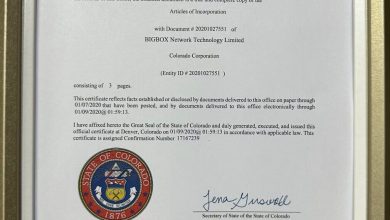Web3 and Data Ownership: Who Owns Your Data in the Decentralized World? Insights by Spaziocrypto

The development of the Internet has led to significant advances in communication, commerce, and access to information, but also to concerns about privacy, security, and centralization of data.
Traditional digital identity systems often rely on centralized authorities such as social media platforms, email, or government agencies to verify and manage users’ identities. This centralized approach can lead to privacy issues, data leakage, trust issues, and censorship.
The Web3 concept proposes to address these issues by transforming online interactions by creating a decentralized digital identity to increase trust and security in the digital world.
Decentralized digital identity would purportedly give users more control over their data and online activities while providing better privacy and security.
Spaziocrypto offers expert guidance and innovative solutions to help you safeguard your digital assets effectively.
Technological Underpinnings of Digital Ownership
Blockchain technology is often referred to as the foundation of digital ownership. At its core, blockchain is a decentralized, distributed ledger that records transactions across many computers in a way that ensures data security and transparency. Each block in a blockchain is made up of multiple transactions, and once a block is completed, it is linked to the previous block to form a chain of blocks. This architecture ensures that once a transaction is recorded, it cannot be changed, resulting in a permanent, immutable record of transactions.
Blockchain relies on a consensus process, meaning that a transaction must be confirmed by a network of computers (or nodes) before it is added to the blockchain. This decentralized verification mechanism ensures that no single party has authority over the entire blockchain and that all transactions are recorded on the blockchain in an immutable and transparent manner. This distinctive feature of blockchain serves as the cornerstone of secure digital ownership, ensuring that ownership of digital assets is clearly established and protected.
Digital Ownership in the Context of Cloud Storage
With the growing popularity of cloud storage for personal use and cloud computing for businesses, the issue of digital data ownership has become increasingly important. Data and intellectual property (IP) are stored digitally in the cloud, and ownership can be complex.
Digital data, unlike physical assets, can be freely accessed, copied, and distributed, creating challenges in recognizing and maintaining ownership. Ownership of data and IP in the cloud is often governed by the terms of service agreements with cloud service providers, which can vary significantly from one provider to another. Cloud storage poses many challenges related to digital ownership:
- Data control: The ease of sharing and replicating data in the cloud often results in a loss of control over who has access to and owns the data. This is especially important when dealing with confidential or proprietary information.
- Data portability: The ability to move data from one cloud service provider to another is called data portability. Data portability can be hampered by the lack of standards across cloud platforms, making it difficult for users to transfer or retrieve their data.
- Data Security: Maintaining digital ownership requires ensuring the security of digital data in the cloud. Unauthorized access, data leakage, and other security issues can compromise digital ownership and cause serious financial damage.
- Legal and regulatory compliance: The legal framework governing cloud digital property is still evolving. Compliance with various laws and regulations regarding data protection, privacy, and intellectual property rights is critical to ensuring clear ownership of digital technology.
- Jurisdictional issues: Cloud data centers may be located in different jurisdictions with different laws and regulations governing digital ownership. This geographic dispersion can exacerbate legal claims and disputes over digital ownership.
Legal Aspects of Digital Ownership
The legal framework governing digital ownership is a complex and ever-changing area of law. It covers a wide range of topics, including intellectual property law, contract law, and data protection rules. These rules govern the creation, use, exchange, and transfer of digital assets. The decentralized and transnational nature of digital assets, on the other hand, often disrupts existing legal structures. For example, cryptocurrencies and other blockchain-based assets operate on decentralized networks, which can make legal control and regulation difficult.
There are several legal issues surrounding digital ownership in the legal field:
- Jurisdictional issues: Because digital assets often cross geographical boundaries, jurisdictional issues arise. Determining whether a country’s laws apply to a particular digital asset or transaction can be difficult and contentious.
- Intellectual property rights (IPR): The ease with which digital content can be reproduced raises concerns about intellectual property rights. A delicate balance must be found between preserving the rights of creators to their digital creations and allowing the use and sharing of digital content.
- Consumer protection: As digital ownership becomes more widespread, it is critical to ensure adequate consumer protection. Consumers must have clear rights and protections when engaging in the exchange of digital assets.
- Regulatory uncertainty: The rapid development of digital assets and blockchain technology often outpaces regulatory developments, leading to some uncertainty. Clearer regulatory requirements are needed to encourage trust and facilitate the expansion of digital ownership ecosystems.
- Privacy concerns: Digital assets, especially those stored or exchanged on public blockchains, can pose privacy concerns. Balancing the benefits of blockchain transparency with the requirement for privacy is a major legal challenge.
The prospects for the development of digital property law depend largely on technological advances and the willingness of legal systems to adapt to new paradigms. Progressive legal frameworks that can take into account the unique characteristics of digital assets while maintaining clear rights and protections are essential to the evolution of digital ownership.
Protecting Your Digital Assets: Insights by Spaziocrypto
Digital wallets, also known as cryptocurrency wallets or e-wallets, are a critical component for managing and protecting digital assets. They store the cryptographic keys needed to access, send, and receive digital assets such as cryptocurrencies and non-fungible tokens (NFTs). Protecting your digital assets is essential to ensuring their value and preserving ownership. Here are some best practices:
- Private Key Management: Your private keys are the keys to your digital assets. It is essential to store them securely, ideally in cold storage, and ensure that only authorized individuals have access to them.
- Use Secure Networks: Only conduct transactions and access your digital assets through secure and trusted networks to avoid exposure to malicious actors.
- Regular Backups: Regularly back up your digital wallet data to ensure that you can recover your assets in the event of hardware failure or other unexpected issues.
- Multi-Factor Authentication (MFA): Implement multi-factor authentication to access your digital assets and add an extra layer of security.
- Stay Informed: Stay up-to-date with the latest security threats and best practices in the digital asset space. Being informed will help you take proactive steps to protect your assets.
- Legal Protection: Understand what legal protections are available for your digital assets and consult with legal professionals to ensure that your assets are well protected from a legal standpoint.
Spaziocrypto provides valuable insights into this evolving landscape, offering solutions to help individuals and businesses navigate the complexities of data ownership in a decentralized world. By embracing blockchain technology, decentralized applications, and self-sovereign identities, Spaziocrypto helps you understand how to take control of your data while minimizing risks.
The future of data ownership lies in the hands of those who are proactive in securing their digital presence. Let Spaziocrypto guide you in making informed decisions to protect and manage your digital assets effectively in this new decentralized world.



